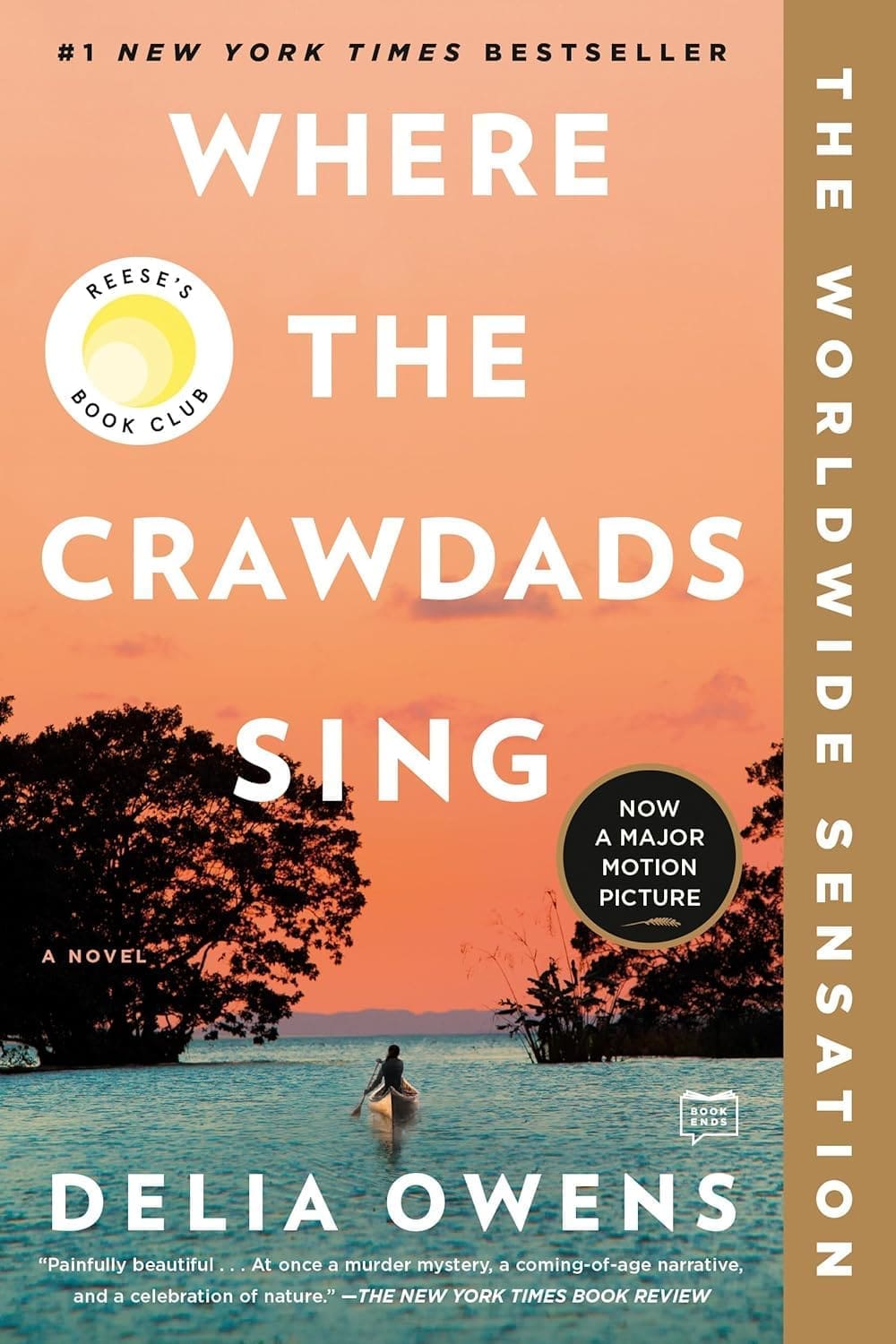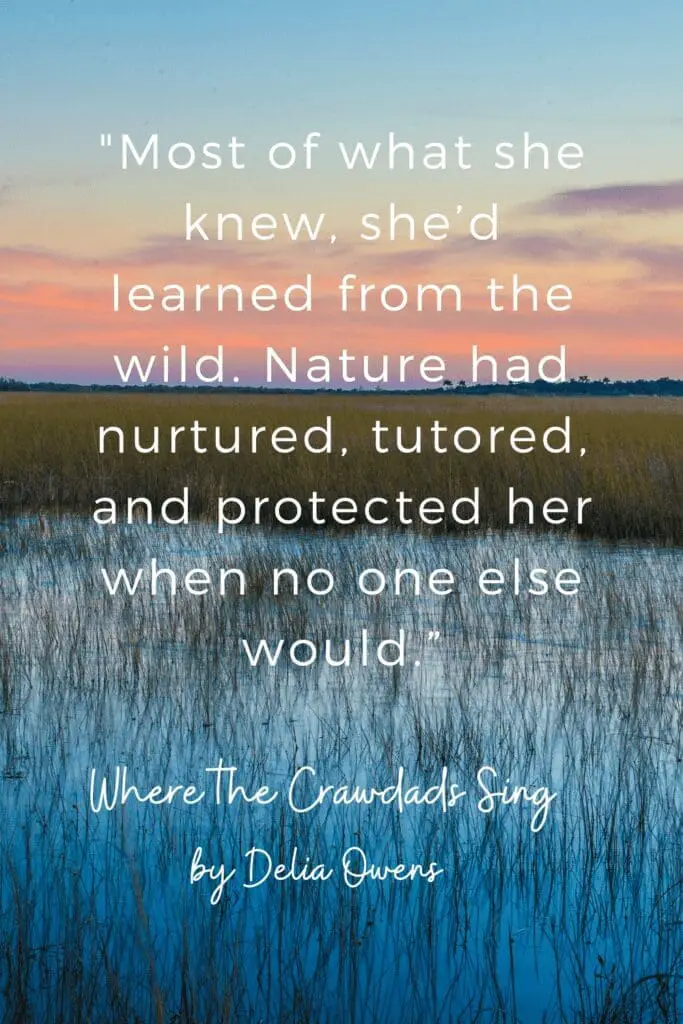The existence of this book is proof that anyone can publish a bestselling novel, no matter their age. At 69 years old, Delia Owens published Where the Crawdads Sing in 2018, and by 2019, it was dominating the top of The New York Times Fiction Bestseller list and has remained there throughout 2020 and into 2022.

The film version has sparked a new wave of interest, but if you have the time, definitely read the book. I read it while spending a long weekend at the beach, and I found it difficult to put down.
The writing has a haunted, melancholy weight that lingers and enchants. The twists are unexpected, and after I finished the book, I sat for a long time thinking through it all. Some books end, and you immediately walk away, moving on to the next, but Where the Crawdads Sing is not one of those books.
While the book reviews are overwhelmingly positive, there are a few critics who feel the plot is hard to believe, or that the last half of the book involving the courtroom scenes shifts the established writing style too far, creating an imbalance. Minor quibbles, especially considering the story is a work of fiction meant to entertain and explore what-if scenarios and the themes of isolation and nature.
If you’re interested in reading the book, check out the link below, and read on for the 17 top quotes from Where the Crawdads Sing by Delia Owens with chapters, page numbers, and listed in order of appearance.
17 Top Quotes from Where the Crawdads Sing by Delia Owens (With Page Numbers)
quotes from where the crawdads sing
1. “When cornered, desperate, or isolated, man reverts to those instincts that aim straight at survival. Quick and just. They will always be the trump cards because they are passed on more frequently from one generation to the next than the gentler genes. It is not a morality, but simple math. Among themselves, doves fight as often as hawks.” Owens, Delia. Where the Crawdads Sing, Chapter 1: “Ma” (p. 8)
2. “Kya laid her hand upon the breathing, wet earth, and the marsh became her mother.” Owens, Delia. Where the Crawdads Sing, Chapter 4: “School” (p. 34).
3. “His dad had told him many times that the definition of a real man is one who cries without shame, reads poetry with his heart, feels opera in his soul, and does what’s necessary to defend a woman.” Owens, Delia. Where the Crawdads Sing, Chapter 6: “A Boat and a Boy” (p. 48).
4. “‘There are some who can live without wild things, and some who cannot.’” Quoted from Aldo Leopold’s “A Sand County Almanac” Chapter 16: “Reading” (p. 103).
5. “I wadn’t aware that words could hold so much. I didn’t know a sentence could be so full.” Owens, Delia. Where the Crawdads Sing, Chapter 16: “Reading” (p. 103).
6. “Well, we better hide way out there where the crawdads sing. I pity any foster parents who take you on.” Tate’s whole face smiled. “What d’ya mean, where the crawdads sing? Ma used to say that.” Kya remembered Ma always encouraging her to explore the marsh: “Go as far as you can—way out yonder where the crawdads sing.” “Just means far in the bush where critters are wild, still behaving like critters.” Owens, Delia. Where the Crawdads Sing, Chapter 17: “Crossing the Threshold” (p. 111).
7. “Autumn leaves don’t fall; they fly. They take their time and wander on this, their only chance to soar.” Owens, Delia. Where the Crawdads Sing, Chapter 17: “Crossing the Threshold” (p. 124).
8. “She could read anything now, he said, and once you can read anything you can learn everything. It was up to her. “Nobody’s come close to filling their brains,” he said. “We’re all like giraffes not using their necks to reach the higher leaves.” Owens, Delia. Where the Crawdads Sing, Chapter 18: “White Canoe” (p. 131).
9. “Within all the worlds of biology, she searched for an explanation of why a mother would leave her offspring.” Owens, Delia. Where the Crawdads Sing, Chapter 18: “White Canoe” (p. 131).
10. “She laughed for his sake, something she’d never done. Giving away another piece of herself just to have someone else.” Owens, Delia. Where the Crawdads Sing, “Chapter 26: “The Boat Ashore” (p. 177).
11. “Not waiting for the sounds of someone was a release. And a strength.” Owens, Delia. Where the Crawdads Sing, Chapter 26: “The Boat Ashore” (p. 181).
12. “Faces change with life’s toll, but eyes remain a window to what was…” Owens, Delia. Where the Crawdads Sing, Chapter 33: “The Scar” (pp. 232-233).
13. “Please don’t talk to me about isolation. No one has to tell me how it changes a person. I have lived it. I am isolation,” Kya whispered with a slight edge.” Owens, Delia. Where the Crawdads Sing, Chapter 33: “The Scar” (p. 237).
14. “I’ve read a lot about this since. In nature—out yonder where the crawdads sing—these ruthless-seeming behaviors actually increase the mother’s number of young over her lifetime, and thus her genes for abandoning offspring in times of stress are passed on to the next generation.” Owens, Delia. Where the Crawdads Sing, Chapter 33: “The Scar” (pp. 237-238).
15. “Let’s face it, a lot of times love doesn’t work out. Yet even when it fails, it connects you to others and, in the end, that is all you have, the connections.” Owens, Delia. Where the Crawdads Sing, Chapter 33: “The Scar” (p. 242).
16. “Well, she might not a’ known that, but I bet she knows a bunch. Those male peacocks struttin’ around, competin’ so much for sex, they can’t hardly fly. I ain’t sure what it all means, but it adds up to something.” Owens, Delia. Where the Crawdads Sing, Chapter 34: “Search the Shack” (p. 246).

17. “She knew the years of isolation had altered her behavior until she was different from others, but it wasn’t her fault she’d been alone. Most of what she knew, she’d learned from the wild. Nature had nurtured, tutored, and protected her when no one else would.” Owens, Delia. Where the Crawdads Sing, Chapter 57: “The Firefly” (p. 363).
Related Posts:
How does the journey taken by the protagonist in “Where The Crawdads Sing” reflect the larger themes of isolation and nature explored in the book?”,
“refusal
Hello! Thanks for reading.
Hi!